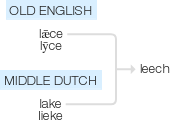Leech
Old English lǣce, lȳce ; related to Middle Dutch lake, lieke .
wiktionary
From Middle English leche(“blood-sucking worm”), from Old English lǣċe(“blood-sucking worm”), akin to Middle Dutch lāke("blood-sucking worm"; > modern Dutch laak).
From Middle English leche(“physician”), from Old English lǣċe(“doctor, physician”), from Proto-Germanic *lēkijaz(“doctor”), of disputed origin, but usually thought to be connected with Proto-Celtic (compare Old Irish líaig(“charmer, exorcist, physician”)) and Serbo-Croatian ljèkār, Polish lekarz(“physician, doctor”); perhaps ultimately from Proto-Indo-European *leǵ-(“to collect, gather”). Cognate with Old Frisian lētza(“physician”), Old Saxon lāki(“physician”), Old High German lāhhi(“doctor, healer”), Danish læge(“doctor, surgeon”), Gothic 𐌻𐌴𐌺𐌴𐌹𐍃( lēkeis, “physician”), Old Irish líaig(“exorcist, doctor”).
From Middle English lechen(“to cure, heal, treat”), from Middle English leche(“doctor, physician”). Compare Swedish läka(“to heal”).
From Middle English lek, leche, lyche, from Old Norse lík(“leechline”), from Proto-West Germanic *līk, from Proto-Germanic *līką (compare West Frisian lyk(“band”), Dutch lijk(“boltrope”), Middle High German geleich(“joint, limb”)), from Proto-Indo-European *leyǵ- ‘to bind’ (compare Latin ligō(“tie, bind”), Ukrainian нали́гати(nalýhaty, “to bridle, fetter”), Albanian lidh(“to bind”), Hittite link- (caus. linganu-) ‘to swear’ (with -n- infix).
etymonline
leech (n.1)
"bloodsucking aquatic worm," from Old English læce (Kentish lyce), of unknown origin (with a cognate in Middle Dutch lake). Commonly regarded as a transferred use of leech (n.2), but according to OED the Old English forms suggest this is a distinct word, which has been assimilated to leech (n.2) by folk etymology. Figuratively applied to human parasites since 1784.
leech (n.2)
"physician" (obsolete, poetical, or archaic), from Old English læce "leech," probably from Old Danish læke, from Proto-Germanic *lekjaz "enchanter, one who speaks magic words; healer, physician" (source also of Old Frisian letza, Old Saxon laki, Old Norse læknir, Old High German lahhi, Gothic lekeis "physician"), literally "one who counsels," perhaps connected with a root found in Celtic (compare Irish liaig "charmer, exorcist, physician") and Slavic (compare Serbo-Croatian lijekar, Polish lekarz), from PIE *lep-agi "conjurer," from root *leg- (1) "to collect, gather," with derivatives meaning "to speak (to 'pick out words')."
For sense development, compare Old Church Slavonic baliji "doctor," originally "conjurer," related to Serbo-Croatian bajati "enchant, conjure;" Old Church Slavonic vrači, Russian vrač "doctor," related to Serbo-Croatian vrač "sorcerer, fortune-teller." The form merged with leech (n.1) in Middle English, apparently by folk etymology. In early Middle English the word also was used of God and Christ; but by 17c. the sense had so deteriorated that leech typically was applied only to veterinary practitioners, and soon it was entirely archaic.
The fourth finger of the hand, in Old English, was læcfinger, translating Latin digitus medicus, Greek daktylus iatrikos, supposedly because a vein from that finger stretches straight to the heart.
leech (v.)
"to cure, heal," c. 1200, from Old English also had a verb læcnian, from the source of leech (n.2). Meaning "to apply leeches medicinally" is from 1802 (implied in leeching), from leech (n.1). Related: Leeched.
